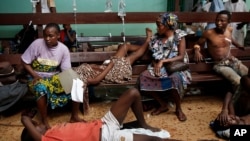UNITED NATIONS —
The U.N. Security Council has unanimously authorized the deployment of French and African troops to the Central African Republic in a bid to stop escalating violence that has left 50 people dead and 90 others wounded in the capital, Bangui today.
The15-nation council authorized financial and logistical support on Thursday to an African stabilization force, known as MISCA, which will comprise about 3,600 troops and police. They will be backed up by 1,200 French troops. The force will be tasked with protecting civilians and restoring law and order to the nation of 4.5 million people.
France is the former colonial power in the Central African Republic and has pushed for international action to stop the deteriorating situation, which began after Seleka forces seized power from the government in March, throwing the country into a spiral of violence.
French Ambassador Gérard Araud noted the reports of fresh attacks overnight in the capital, Bangui, saying it only emphasizes that it is time to act.
“The entire population is subject to a humanitarian crisis," he said. "Thugs are killing, looting and raping, on a daily basis. The Central African state has collapsed and is not able anymore to ensure the protection of its own population. The conflict is now increasingly taking an inter-sectarian turn with violence erupting between Christians and Muslims.”
The resolution authorizes the deployment of MISCA for one year and provides the mission with logistical and financial support, as well as a robust Chapter 7 U.N. mandate to “use all necessary measures” to carry out the protection of civilians and restore calm.
It also imposes an arms embargo on the Central African Republic and expresses the council’s willingness to quickly impose targeted sanctions on political spoilers and human rights violators. It focuses on human rights abuses and establishes a Commission of Inquiry.
In the meantime, the resolution authorizes the United Nations to begin contingency planning for a full-fledged U.N. peacekeeping operation next year, should it be required.
U.S. Ambassador Samantha Power, whose government has pledged $40 million for training and equipping MISCA, said the Obama administration is deeply disturbed by the violence.
“It is clear that urgent action is required to save lives," she said.
African Union Ambassador Tete Antonio welcomed the resolution, telling the Security Council that it is a crucial step in developing a comprehensive and coordinated international response to the situation. The CAR’s envoy said the U.N. action will give reasons to “hope for a new dawn rising” over the country.
The15-nation council authorized financial and logistical support on Thursday to an African stabilization force, known as MISCA, which will comprise about 3,600 troops and police. They will be backed up by 1,200 French troops. The force will be tasked with protecting civilians and restoring law and order to the nation of 4.5 million people.
France is the former colonial power in the Central African Republic and has pushed for international action to stop the deteriorating situation, which began after Seleka forces seized power from the government in March, throwing the country into a spiral of violence.
French Ambassador Gérard Araud noted the reports of fresh attacks overnight in the capital, Bangui, saying it only emphasizes that it is time to act.
“The entire population is subject to a humanitarian crisis," he said. "Thugs are killing, looting and raping, on a daily basis. The Central African state has collapsed and is not able anymore to ensure the protection of its own population. The conflict is now increasingly taking an inter-sectarian turn with violence erupting between Christians and Muslims.”
The resolution authorizes the deployment of MISCA for one year and provides the mission with logistical and financial support, as well as a robust Chapter 7 U.N. mandate to “use all necessary measures” to carry out the protection of civilians and restore calm.
It also imposes an arms embargo on the Central African Republic and expresses the council’s willingness to quickly impose targeted sanctions on political spoilers and human rights violators. It focuses on human rights abuses and establishes a Commission of Inquiry.
In the meantime, the resolution authorizes the United Nations to begin contingency planning for a full-fledged U.N. peacekeeping operation next year, should it be required.
U.S. Ambassador Samantha Power, whose government has pledged $40 million for training and equipping MISCA, said the Obama administration is deeply disturbed by the violence.
“It is clear that urgent action is required to save lives," she said.
African Union Ambassador Tete Antonio welcomed the resolution, telling the Security Council that it is a crucial step in developing a comprehensive and coordinated international response to the situation. The CAR’s envoy said the U.N. action will give reasons to “hope for a new dawn rising” over the country.




